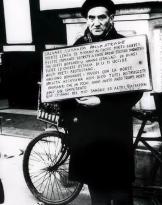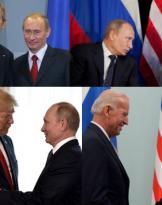While the whole world, and Europe in particular, continues to have its eyes fixed on the developments of the Russo-Ukrainian War, in the heart of the Old Continent, in the center of Central Europe, a low-level crisis has been taking place for twelve years now. intensity that has now transformed one of the geopolitical bastions of regional stability, Hungary, into a hotbed of activity dangerous for European and world peace.
But before talking in detail about the "seismic fault lines" that the Hungarian state and its people are crossing, it is necessary to devote the current analysis to the study of man who, more than any other, has marked both internal and political politics. of Hungary over the past thirty years, literally shaping it in its image and likeness: the leader of the Fidesz party and Prime Minister Viktor Mihály Orbán.
Born on May 31, 1963 in a rural family of modest origins, Orbán has been in power consecutively since 2010. In this period of time he has effectively reformed the young Hungarian democracy into what he himself euphemistically defined as "an illiberal democracy" at the same time creating a well-oiled system to stay in power, strengthening strategic agreements with the United States and Israel but at the same time also with Russia, China and Turkey, and openly challenging the institutions of the European Union.
Its stated aim is to create an alternative to democracy in its "Western" sense and, for the moment, its strategy seems to be working. The thing would be paradoxical were it not that he owes the reason for his initial success as a politician to democracy.
The young Viktor came to the fore in politics in his native country on June 16, 1989, at the age of 26, in the midst of the crisis of the Hungarian communist regime, when on the occasion of the public celebration held on Hősök tere (literally "the square of Heroes ”) to commemorate the reburial of Imre Nagy, hero of the 1956 Revolution, publicly expressed himself in favor of organizing free elections and for the withdrawal of Soviet troops stationed in Hungary.
His words did not remain a dead letter because on October 23 of the same year, the People's Republic of Hungary was officially dissolved and two years later, on the eve of the disintegration of the USSR, the last troops of the Red Army left the country.
Hungary's subsequent transition from a socialist to a capitalist political-social-economic management system was brutal for both society and the economy. The loss of both jobs and any social parachute affecting the lives of citizens was accompanied by an explosion of sovereign debt. In an attempt to alleviate the situation, the government began (as was the case in the rest of the ex-communist countries) and privatized state assets at balance prices which ended up irremediably in the hands of shady businessmen with important political connections.
Already in 1988, accompanied by a handful of friends who had become his loyalists over the years, Orbán had founded the party of liberal tendencies Fidesz with which he had participated in the first democratic elections in the history of the country, but collected a measly 6%, threshold minimum to access the National Assembly. But soon the skilled tactician identified for himself and for his men the possibility of expanding his electoral base to the right, where the national political system of the time was particularly weak and jagged. The move proved to be spot on as in subsequent elections the percentages of votes and representative seats continued to rise.
In 1998 he succeeded in becoming prime minister for the first time, subsequently overseeing Hungary's accession to NATO in 1999 and its participation in the Kosovo War alongside the Atlantic Alliance, and laying the groundwork for accession to NATO. Hungary in the European Union. Despite these and other relative successes, the 2002 and 2006 elections ended in as many defeats for Fidesz, who was relegated to the opposition; a humiliation that made Orbán, if possible, even more angry and "entangled" with the logic of power.
At this point the conversion to the nationalist camp was definitively accomplished and he became the number one enemy of the Socialist Party in power.
Meanwhile, in 2006, Hungary joined the European Union and this involved a massive transfer of capital and both institutional and private investments that acted as a driving force for the national economy. At that time it was thought that this influx of money would help make the foundations of the young Hungarian democracy stronger and more stable, however after the scandal and protests following the infamous "Őszöd speech", during which the then prime minister and leader of the Socialist Party, Ferenc Gyurcsány, admitted to a small audience of the party that the country was in the hands of corruption and chronic institutional inefficiency, Orbán quickly managed to regain the positions and the consensus he had lost, triumphing in the elections of the 2010 and conquering, thanks to the electoral law of the country, a super parliamentary majority of 67% which allowed him from that moment to make and undo the laws as he pleased.
First, he had the constitution rewritten, thus enshrining the values of his party's conservative agenda at the highest level, adding explicit references to the country's Christian foundations and consolidating its power. Then he went on to modify the electoral law giving the right to vote to ethnic Magyars residing in the territories of historic Hungary and securing their support thanks to a mix of economic transfers and "political Caesarism".
The next step was to cut the number of members of the National Assembly while at the same time manipulating the subdivision of electoral districts to favor the candidates of his party and at the same time replacing the system based on the double round with one centered instead on a single dry round giving thus the advantage to the largest party (his) in any election.
Equally effective was the progressive subversion of the judicial system. Whenever a Supreme Court judge was forced to retire due to seniority limits, Orbán replaced him with one more condescending to his Fidesz party.
Once both the constitution order and the judicial system were subverted, the Hungarian leader was free to shape the country in his image and likeness.
Despite some opposition from the European institutions, in the last 10 years the "Eurocrats" of Brussels have been so busy managing (with very questionable effectiveness!) The Eurozone crisis that they have not been able to organize a resistance worthy of the name against the enterprising neo-autocrat of Budapest, who, moreover, cleverly exploiting his links with the other conservative and nationalist parties of Europe, has always managed to get away with receiving nothing more than warnings.
Meanwhile, within the country, the prime minister's position of pre-eminence is further cemented by the casual management of both European and government contracts that Orbán assigns with painstaking precision to that part of the business world closely linked to the Fidesz party. As if that were not enough, the entrepreneurs are further "loyal" through the sale of the productive assets of the state, of lands belonging to the public domain and apartments located in prestigious places sold at discounted prices (even if they were modern feudal lords!).
This perverse modus operandi creates what is in effect a system of state corruption not unlike what exists in full-blown totalitarian regimes. Power-bound businessmen then return these "favors" by lavishly funding the Fidesz party while those who do not align with this system are threatened, forced to sell their properties and, in some extreme cases, pushed to leave the country.
Curiously, while Orbán has repeatedly boasted that he does not have large sums in his bank account, his son-in-law Tiborcz István (husband of his eldest daughter, Ráhel) and his father Győző Orbán have become two of the richest men in the country thanks to privileged relationships that bind them to the prime minister. In particular, Elios, the company owned by Tiborcz István has been accused several times of enjoying privileged treatment whenever it has submitted to tenders for public contracts. But these aren't the only names. The richest man in Hungary, the oligarch Lőrinc Mészáros, is in fact a childhood friend of Orbán's own (as well as being, between 2011 and 2018, mayor of Felcsút, the village where the prime minister grew up) . Interviewed in 2017 about how he could have become the richest man in the country when in 2009 he was just a small business owner, the oligarch replied with the exact words: "My wealth is based on three factors: God, luck and Viktor Orbán". Just in the period in which Mészáros was the mayor, the village of Felcsút rose to the headlines both nationally and internationally because it was built one of the most important football stadiums in the country (called Pancho Arena): an authentic “cathedral” capable of seating 3.900 when the population of the entire village does not exceed 1.800 inhabitants.
The cost of the pharaonic project seems to have been around 4 billion Hungarian forints and it also represented the last "earthly effort" of Imre Makovecz, one of the most important architects of modern Hungary, before his earthly departure. This absolutely useless project has rightly raised the most ferocious criticisms given that the companies involved in its construction had previously been favored by the government in winning a whole series of state contracts. In addition, a large part of the work on the spot was carried out by manpower enlisted with para-mafia methods, especially among the members of the Roma community of Hungary, for years in the sights of the prime minister, and made to work in conditions that several observers have described as " inhuman ". However the Pancho Arena it is by no means an isolated case in the Hungarian panorama because the government has guaranteed important tax reliefs to companies that wish to donate funds or invest in the field of sports construction. And the world of sport, supported in every way by the country's “master father” as well as by many other public figures, is then used by Orbán to distract the masses, as a sort of modern re-edition of the Latin saying “panem et circenses”.
It seemed that in 2015 Orbán's political party was finally losing some of the support among the moderate electorate, but the events of the now famous "Migrant Crisis" ended up opening up a series of new opportunities for him. In fact, taking the ball and playing both on the deep xenophobic instincts of the Hungarian people and on the tacit consent coming from the other leaders of European countries and nationalist political parties, the "Little Duce of Budapest" leads what appears to be a sort of "Crusade for the defense of European civilization from the invasion of the Islamic hordes" (it does not matter that, in reality, a by no means negligible percentage of migrants fleeing Syria and Iraq are actually Christian!).
Taking advantage of the situation, he is granted full powers by the National Assembly, orders the construction of a barrier of fences and barbed wire that will eventually cover the entire border that Hungary shares with Serbia, Croatia and Romania and, as if that were not enough It also manages to prevent any attempt by the authorities of the European Union to distribute migrants among all the countries of the Union, including those of Eastern Europe. From that moment on, the latter will start a dangerous game which, to date, has in fact led them on a collision course against the rest of the bloc, whose funds they continue to need but whose vision of a united and united Europe has also become for them a real anathema.
The beginning of the defamation campaign, still in progress, directed against the billionaire of Jewish-Hungarian origin George Soros (born in Budapest in 1931 under the name of György Schwartz) also dates back to this period, described as a sort of "Deus ex machina" responsible for the attacks against the Hungarian government in order to bend it to adopt a different migration policy.
Really an irony of history if we think that it was thanks to Soros and the funding of his foundation (the Open Society) that the then young Orbán was able to obtain a scholarship to Oxford, in the early 90s.
The 2018 general elections closed with a new victory for the Fidesz party and the conquest of another "supermajority", but were also tainted by accusations of blatant electoral intimidation (especially against public employees, blackmailed by the threat of losing their jobs of work) as well as the practice of "electoral shopping" with the men of the apparatuses committed to circumventing the voters (especially in areas far from the capital) by distributing basic necessities among which the sacks of potatoes must be curiously mentioned!
Another element of concern is the fact that he has never put an end to the "State of Emergency" and indeed renews his powers every 6 months. Some commentators, not too well informed, have been tempted to create parallels between the figure of the Magyar “ducet” and that of the Roman “dictator”. Never this parallelism turned out to be more far-fetched than this given that (it should be remembered) in the Republic of Ancient Rome, the figure of the "dictator" could indeed collect all the emergency powers, but it was by no means renewable after the expiry of the 6 months, and in any case it automatically expired when the consuls who had appointed it expired!
In any case, the "Hungarian dictator" does not let the periods of successive renewals of his special powers go to waste, and indeed continues in his methodical work of changing the constitution and eroding the "checks and balances" necessary for the carrying out of the normal democratic life.
The changes that guarantee the government the power to deploy the army in "emergency situations", ban public demonstrations and, above all, control the media, fall into this vein. In fact, in 2018 KESMA was born, an acronym that stands for Közép-Európai Sajtó és Média Alapítvány ("Central European Press and Media Foundation", in English) which, in the following years, will come to control over 80% of the media in the Central European state , especially thanks to the work of longtime loyalists such as Gábor Liszkay and László Szabó.
Although for a brief time reading it seems that the "media grab" has finally made the definitive danger bell ring in the ears of the Brussels authorities, their reaction is in practice canceled by the opposition of Poland, whose government of right led by the "Law and Justice" (PiS) party represented by President Andrzej Sebastian Duda and Prime Minister Mateusz Jakub Morawiecki now openly supports Fidesz as an "iron ideological brother".
Thanks to the Hungarian-Polish collaboration, Orbán manages to avoid any kind of European sanction and to survive the storm of the moment. However, as a further "insurance policy" on his political life, the leader of Budapest enters into a series of tactical-strategic agreements with the governments of Russia and China and extends his geopolitical range of action to the entire Balkan area, where it carves out a niche of power of considerable size, especially in Belgrade, the capital of Serbia, and in Banja Luka, the capital of the Serbian Republic of Bosnia.
Thanks to these agreements, Orbán is able to obtain raw materials at discounted prices and financing for a series of large infrastructural processes and in return becomes a sort of "Trojan horse" for both Beijing and Moscow within NATO and the Union. European by contributing, as already happens with Erdogan's Turkey, to make these organizations substantially dysfunctional. If we then consider that to date Hungary (together with Poland) is the main beneficiary of European funds, the fact that the rest of the EU members, especially those belonging to the so-called "Old Europe" who hold the real " portfolios "that allow the EU to function as an institution (and these" portfolios "consist of the taxes paid by taxpayers, that is, by each of us), the fact that Hungary is allowed to do good and bad weather at the expense of all of us is frankly unacceptable.
The bottom of the barrel was reached during this year 2022 when Hungary, while participating in the humanitarian aid program in favor of neighboring Ukraine, under attack by the Armed Forces of the Russian Federation, and despite being one of the countries of first line to welcome Ukrainian refugees, it has also refused to supply armaments (even refusing to allow such weapons to pass through its territory!) and has deliberately slowed down (if not simply buried!) the path of European sanctions aimed at striking Russia. However, it is necessary to note that such unscrupulous conduct paid very well in the electoral seat, as it allowed him on 3 April 2022 to obtain his biggest electoral victory, against the entire opposition coalesced in a single front and to confirm and cement once and for all the "supermajority" and its control, now basically irreversible, over the country.
The conduct of Budapest and of Orbán in particular are bad indicators of what could be the long-term objectives of Hungarian foreign policy, but to be able to express ourselves in this regard, a new analysis will be necessary, this time having as its object the geopolitical trajectory of ' Hungary also seen through the lens of the demographics of this complicated but strategic Central European country.
Photos: www.gov.cn












